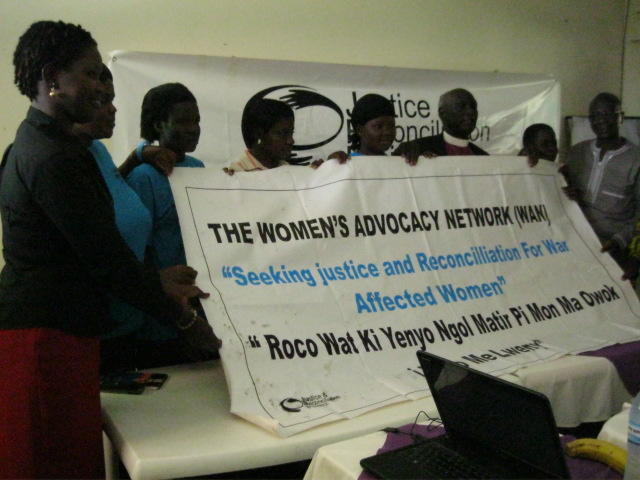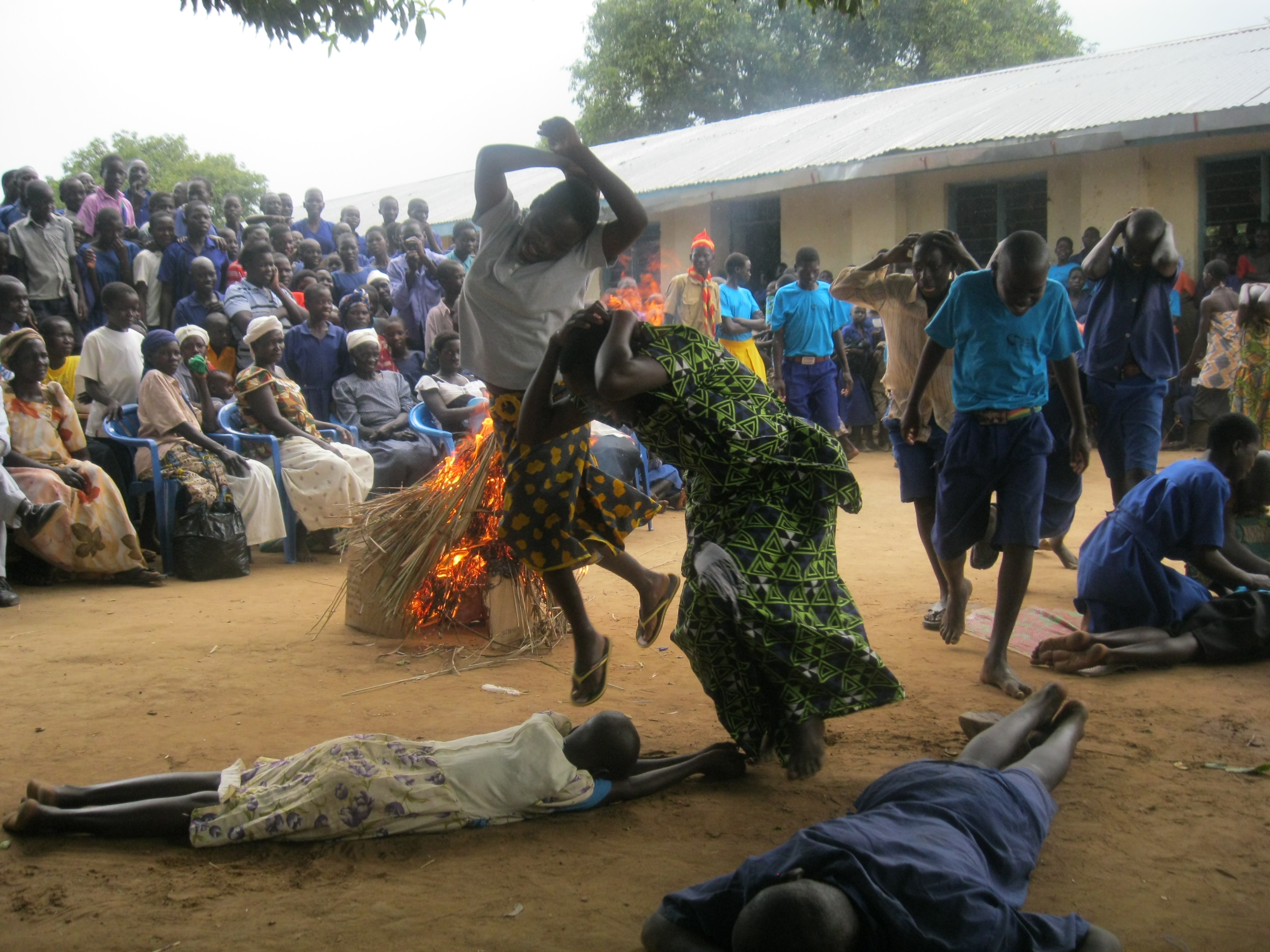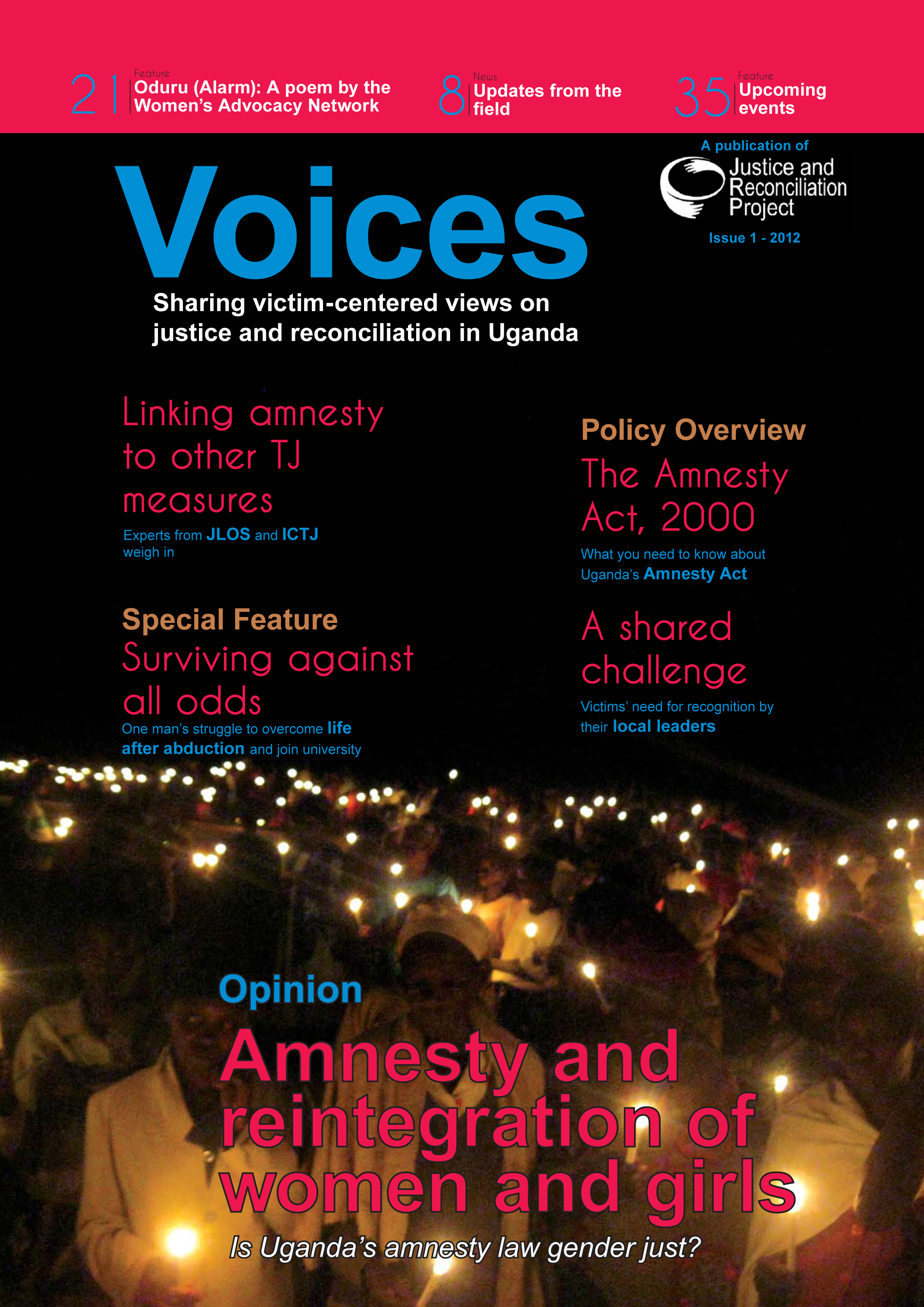
Download: 2013 Annual Report (pdf)

Download: 2013 Annual Report (pdf)

We are pleased to introduce the Women’s Advocacy Network (WAN), an initiative of the Justice and Reconciliation Project (JRP), which was officially launched May 25th in Gulu, northern Uganda.
The WAN is a forum where war-affected women come together to advocate for justice, acknowledgment and accountability for gender-based violations inflicted upon them during war in northern Uganda. It was formed in May 2011 by JRP with the aim of empowering women survivors to participate in post-conflict policy debates and to engage grassroots communities in gendered discussions on reintegration and reconciliation.
JRP’s field observations since 2006 have explored the unique challenges facing women in northern Uganda and the need for the inclusion of their voices in ongoing developments in transitional justice. A group of war-affected women, who were engaged in a storytelling project at JRP, proposed the establishment of an advocacy group to serve as a platform through which female leaders would be empowered to engage in advocacy for justice and peace. The WAN was created with the goal of bridging the existing gaps in gender justice.
To learn more about the Women’s Advocacy Network (WAN) at JRP, please see the attached brochure or contact the JRP Gender Justice department at +256(0)471433008 or email info@justiceandreconciliation.

[yframe url=’http://www.youtube.com/watch?v=5BN7WO-kDcI’]
On September 28, 2011, the Abia Children for Peace, Restoration and Reconciliation Club at Abia Primary School presented a community theatre performance on the 2004 Abia massacre and its impact on children and youth. This performance was supported by the Justice and Reconciliation Project (JRP) under the Community Mobilization department’s theatre programme, which aims to empower conflict-affected persons and groups to use theatre as a medium for generating community discussions on seeking justice and reconciliation after conflict. The drama’s theme and script were entirely drafted by the actors.
©Justice and Reconciliation Project 2012

Click here to view the full issue.
JRP is pleased to announce the release of its latest quarterly publication, Voices magazine. Our mission is to empower conflict-affected communities to participate in processes of justice, healing and reconciliation, and this magazine aspires to do just that. By providing a regular, open platform for victims and key stakeholders to dialogue on local and national transitional justice developments, we will be “sharing victim-centered views on justice and reconciliation in Uganda” each quarter.
The theme of this first issue is amnesty. With Uganda’s Amnesty Act up for expiration, renewal or renewal with amendments on 24 May, we have sought to present the views of the war-affected communities where we operate. In this issue, key stakeholders like Michael Otim of the International Center for Transitional Justice (pg 13), Ismene Nicole Zarifis, International Technical Advisor on TJ for JLOS (pg 6,) and members of the JRP team address the important question: What should be the future of Uganda’s Amnesty Act? Like all of our work, we hope this collection of views contributes to the policy-making process currently taking place in Kampala, and links the grassroots with the decision-makers.
We hope to hear from you on what you think of this first issue. To share your comments, please write to info@justiceandreconciliation.com or SMS +256(0)783300103. Your comments might just appear in the next edition!
We also welcome article submissions of no more than 1,500 words for future issues. The next issue will focus on reparations for victims of conflict.
Click here to view the full issue.
Note: If printing on a B&W printer, we recommend you print this grayscaled version.

Voices Magazine Issue 1, 2012 (Amnesty)

This is the first issue of the Justice and Reconciliation Project’s (JRP) latest publication, Voices magazine. JRP’s mission is to empower conflict-affected communities to participate in processes of justice, healing and reconciliation, and this magazine aspires to do just that. By providing a regular, open platform for victims and key stakeholders to dialogue on local and national transitional justice developments, we will be “sharing victim-centered views on justice and reconciliation in Uganda” each quarter.
The theme of this first issue is amnesty. With Uganda’s Amnesty Act up for expiration, renewal or renewal with amendments on 24 May, we have sought to present the views of the war-affected communities where we operate. In this issue, key stakeholders like Michael Otim of the International Center for Transitional Justice (pg 13), Ismene Nicole Zarifis, International Technical Advisor on TJ for JLOS (pg 6,) and members of the JRP team address the important question: What should be the future of Uganda’s Amnesty Act? Like all of our work, we hope this collection of views contributes to the policy-making process currently taking place in Kampala, and links the grassroots with the decision-makers.
Note: If printing on a B&W printer, we recommend you print this grayscaled version.
This annual report outlines JRP’s accomplishments over the past year and highlights our commitments to bringing grassroots communities together to galvanise efforts for justice and human rights. It outlines key activities from the Community Documentation, Community Mobilization, Gender Justice and Communications departments and is a selection and general overview of our outputs and accomplishments in 2011.
To download the report, click here.
We have added an ‘About JRP’ powerpoint slideshow that provides basic information on our history and work. You can view it by going to About–>Information Kit on our menu bar or download the file by clicking here.
[powerpoint http://justiceandreconciliation.com/wp-content/uploads/2011/06/About-JRP-Slideshow-SM.pptx 604 500]
“#Ugandans 2012,” Canadian International Council, 12 March 2012
http://www.opencanada.org/features/ugandans2012/
By Erin Baines
After being relentlessly pursued by the Ugandan military for more than a year, eight-year old Aling – a daughter born of forced marriage to one of the high commanders of the Lord’s Resistance Army (LRA) – was tired and scared. One morning after a particularly deadly attack, she turned to her mother and asked, “Mama, why can’t we just leave this army?” Her mother had spent 14 years as a forced wife. She knew the risks involved in betraying the rebels, yet she could not refuse her child. They left that night.
The commander was enraged. He sent 20 of his best soldiers to bring back his daughter and kill his wife. As they went, one of the soldiers said to the others, “Aling’s mother is a good woman. She has helped us many times when we were injured or needed comfort. Why should we not follow her instead of the commander?” They too escaped, joining Aling and her mother at a rehabilitation centre in Pajule, Pader District.
Some days later, having heard that his soldiers, wife and daughter were in the nearby centre, the commander dispatched another 70 soldiers to attack the place, ordering them to kill everyone. As they got nearer, the soldiers surrendered their guns to the local officials. They too followed the lead of Mama Aling, the mother of the child who asked if it was not time to go home.
Since the early 2000s, the Ugandan initiative, the Justice and Reconciliation Project (JRP), a Ugandan initiative, has recorded some of the worst human rights abuses that have taken place during the war, and the efforts of people like Mama Aling to stop them. JRP documents the stories of ordinary people caught between the warring parties – of those pressed into fighting against their will, and those who are born of circumstances not of their choosing. The organization got the help of dozens of persons in displaced camps who, for years, volunteered to keep track of, and record, what was happening there.
At the height of the war, the original JRP team walked, rode bicycles and boda boda (motorcycles), and travelled in the backs of trucks to reach areas that no international journalist or advocate would go to. At the time, people weren’t permitted to travel even a few kilometres our to town after curfew.
Members of the JRP team – who are about the same age as Jason Russell, the maker of the Kony 2012 film – document the memories of massacre survivors. They record stories of sexual violence and the ways women and men resist armed soldiers. They speak to parents whose children are still missing. They listen to commanders who surrendered and who regret the atrocities they committed. They try to move beyond the good-guy-bad-guy model, recognizing the extraordinary circumstances in which soldiers commit violence against others, as children who grew up in war and were forced to fight.
Sometimes this work is overwhelming. It often feels like documentation and advocacy is not enough. At some point, each member of the team has held heads in hands and wept following an interview, or after meeting a community. After the tears, they gather courage and write it all down. Then they go and talk about it with local officials and request a resolution.
They publish reports and news articles, do tours and hold radio programmes in order to bring the voices of communities to national and international debate and attention. This isn’t always an easy task.
In 2007, Boniface Ojok, the project’s coordinator, met with the LRA and government representatives to the peace talks. He sat in between the heads of the two delegations and told them what he has seen and learned about justice from people on the ground.
Co-founder Michael Otim put his life on hold for more than two years, attending each and every peace talk between 2006 and 2008 as an advisor to a delegation of cultural and religious leaders.
JRP’s advocacy is not just with officials and leaders, however. It also engages the communities most affected by the war. JRP’s members utilize oral history, dance, song, drama, poetry, radio programs, community dialogues and public marches to share what they have learned at national debates, and to promote ownership of advocacy. They help survivors found their own advocacy groups, and when resources are available, they bring survivors to meet with officials and leaders.
For example, JRP supports storytelling sessions among a group of war-affected women Gulu, a town in northern Uganda. These sessions provide a space in which women can speak freely about their memories of war and the challenges of daily life. As word spread about the group, so many women wanted to join that new groups started to form. On International Women’s day this year, IRP formally launched the Women’s Advocacy Network, with over 200 members. The group’s chairperson, Evelyn Amony, spent more than 10 years in captivity. She believes she survived the war to tell her story, and to help others tell theirs.
This is courageous and exhausting work, but JRP is not alone. Hundreds of local and national organizations work to document and remember, and to insist on justice. There is Human Rights Focus (HURIFO), for instance, which operated as the only human-rights organization in the region for many years. There is also the Acholi Religious Leaders Peace Initiative, an interdenominational group (Catholic, Presbyterian, Anglican and Muslim) that has repeatedly met with the rebels and government in attempts to persuade them of the need for peace talks.
There is Alice Achan, who rallied her community together to build a shelter for the hundreds of children who escaped rebel captivity but had no where to go, and no way to find their parents. In the shelter, she loved and nourished each one of them until they could be reunited with their families. Then there is the Concerned Parents Association, which formed after 139 girls were abducted from St. Mary’s College in Aboke. Women like Angelina Atyam travelled the world over and back (she even met Oprah!) to find their children.
During the nearly 10 years I have worked in Uganda with advocates, survivors and researchers, I have never heard them lobby for military intervention. In fact, the opposite is true: Ugandans have consistently insisted on an amnesty process for rebels, recognizing that many soldiers were forced into combat as children. Most prefer to talk peace rather than wage war. It is common knowledge that the first to be killed in military raids are the most recently abducted kids.
This is not to say that Ugandans do not want to stop Kony, or that they do not want justice. Nor is it to say that local leaders are perfect and know all the solutions, or that they speak with one voice. This is not the case.
The point is, Ugandans, along with people in the Democratic Republic of the Congo, the Central African Republic, Sudan and many other countries around the world, are working for peace in both extraordinary and ordinary ways that are often off “the grid”.
They do so that the world is a better place for their children – so that it is better for Jason Russell’s children – and they do it without ever being called a hero.
So alongside the current media hubbub around Kony 2012, how about celebrating the heroism of thousands of Ugandans like Aling, Boniface, Evelyn, and Alice, building peace and working for justice despite the war. How about #Ugandans2012?
[yframe url=’http://www.youtube.com/watch?v=m4EVVuBc1tA&feature=youtu.be’]
On November, 11, 2011, the International Crimes Division (ICD) of the High Court of Uganda convened at the High Court in Gulu to follow recommendations set forth by the Constitutional Court pertaining to the trial of ex-LRA commander Col. Thomas Kwoyelo. After the ICD ordered the cessation of the trial and referred Kwoyelo’s release to the DPP and the Amnesty Commission, JRP’s Lino Owor Ogora answered questions by media outside the court building.
Copyright © 2011 Justice and Reconciliation Project